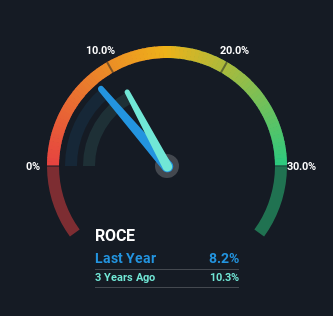Corus Entertainment (TSE:CJR.B) Will Be Looking To Turn Around Its Returns
If we're looking to avoid a business that is in decline, what are the trends that can warn us ahead of time? A business that's potentially in decline often shows two trends, a return on capital employed (ROCE) that's declining, and a base of capital employed that's also declining. This reveals that the company isn't compounding shareholder wealth because returns are falling and its net asset base is shrinking. So after glancing at the trends within Corus Entertainment (TSE:CJR.B), we weren't too hopeful.
Return On Capital Employed (ROCE): What Is It?
For those who don't know, ROCE is a measure of a company's yearly pre-tax profit (its return), relative to the capital employed in the business. Analysts use this formula to calculate it for Corus Entertainment:
Return on Capital Employed = Earnings Before Interest and Tax (EBIT) ÷ (Total Assets - Current Liabilities)
0.082 = CA$175m ÷ (CA$2.8b - CA$653m) (Based on the trailing twelve months to November 2023).
So, Corus Entertainment has an ROCE of 8.2%. Even though it's in line with the industry average of 8.4%, it's still a low return by itself.
See our latest analysis for Corus Entertainment

In the above chart we have measured Corus Entertainment's prior ROCE against its prior performance, but the future is arguably more important. If you'd like to see what analysts are forecasting going forward, you should check out our free report for Corus Entertainment.
How Are Returns Trending?
The trend of ROCE at Corus Entertainment is showing some signs of weakness. Unfortunately, returns have declined substantially over the last five years to the 8.2% we see today. In addition to that, Corus Entertainment is now employing 52% less capital than it was five years ago. The combination of lower ROCE and less capital employed can indicate that a business is likely to be facing some competitive headwinds or seeing an erosion to its moat. Typically businesses that exhibit these characteristics aren't the ones that tend to multiply over the long term, because statistically speaking, they've already gone through the growth phase of their life cycle.
On a side note, Corus Entertainment's current liabilities have increased over the last five years to 23% of total assets, effectively distorting the ROCE to some degree. If current liabilities hadn't increased as much as they did, the ROCE could actually be even lower. While the ratio isn't currently too high, it's worth keeping an eye on this because if it gets particularly high, the business could then face some new elements of risk.
What We Can Learn From Corus Entertainment's ROCE
In summary, it's unfortunate that Corus Entertainment is shrinking its capital base and also generating lower returns. This could explain why the stock has sunk a total of 82% in the last five years. With underlying trends that aren't great in these areas, we'd consider looking elsewhere.
Corus Entertainment does have some risks though, and we've spotted 1 warning sign for Corus Entertainment that you might be interested in.
While Corus Entertainment isn't earning the highest return, check out this free list of companies that are earning high returns on equity with solid balance sheets.
New: AI Stock Screener & Alerts
Our new AI Stock Screener scans the market every day to uncover opportunities.
• Dividend Powerhouses (3%+ Yield)
• Undervalued Small Caps with Insider Buying
• High growth Tech and AI Companies
Or build your own from over 50 metrics.
Have feedback on this article? Concerned about the content? Get in touch with us directly. Alternatively, email editorial-team (at) simplywallst.com.
This article by Simply Wall St is general in nature. We provide commentary based on historical data and analyst forecasts only using an unbiased methodology and our articles are not intended to be financial advice. It does not constitute a recommendation to buy or sell any stock, and does not take account of your objectives, or your financial situation. We aim to bring you long-term focused analysis driven by fundamental data. Note that our analysis may not factor in the latest price-sensitive company announcements or qualitative material. Simply Wall St has no position in any stocks mentioned.
About TSX:CJR.B
Corus Entertainment
A media and content company, operates specialty and conventional television networks, and radio stations in Canada and internationally.
Undervalued with slight risk.
Similar Companies
Market Insights
Community Narratives


Recently Updated Narratives

Constellation Energy Dividends and Growth

CoreWeave's Revenue Expected to Rocket 77.88% in 5-Year Forecast

Bisalloy Steel Group will shine with a projected profit margin increase of 12.8%
Popular Narratives


MicroVision will explode future revenue by 380.37% with a vision towards success


NVDA: Expanding AI Demand Will Drive Major Data Center Investments Through 2026



